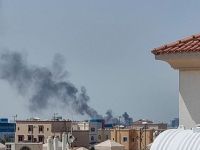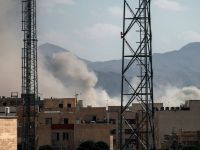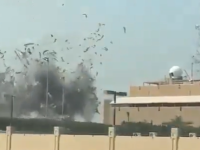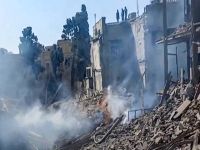Egyptian security forces fired tear gas in Cairo’s Tahrir Square to disperse anti-government protesters Sunday, as Egypt approved a draft constitution potentially paving the way for presidential elections to be held before parliamentary polls.
Clashes also erupted in the capital between residents and police after a policeman shot dead a student following an argument, security officials said.
The draft constitution reflects how the balance of power has shifted in Egypt since secular-minded generals deposed Islamist President Mohammad Morsi in July after mass protests against him. It contains language that could ban Islamist parties outright.
The constitution marks a potential change to the political road map outlined by the army when it took power, which stated that parliamentary elections must come first. The amended provision avoids stipulating what order the elections should come in.
The change was announced by former Arab League Secretary-General Amr Moussa, chairman of the 50-member constituent assembly, as it completed its final draft Sunday.
It must be put to a referendum before new elections, which Morsi’s Muslim Brotherhood, driven underground by security measures and a legal ban, is unlikely to contest.
“The people want to topple the regime,” chanted several hundred protesters who descended on Tahrir Square, epicenter of the 2011 uprising against the ousted long-time autocratic President Hosni Mubarak.
Though it only lasted about half an hour before security forces acted, it appeared to be the biggest protest by Brotherhood sympathizers in Tahrir since Morsi’s fall. “With our blood and souls we sacrifice for you, Islam,” chanted some.
Supporters of Morsi stage near daily protests in Cairo and across much of the country to demand his reinstatement. But for hundreds of them to enter and take over Tahrir, even briefly, constituted a major, albeit symbolic, propaganda coup for them. They would have attracted many more like-minded protesters had they been able to gain a solid foothold in the square.
The location has been the near exclusive domain of liberal and secular protesters since shortly after Morsi took office in June 2012 as Egypt’s first freely elected president.One scaled a lamppost where he hung a picture of Morsi. Others flashed the four-finger sign denoting sympathy with the hundreds of Morsi supporters shot dead by the security forces when they broke up their Cairo sit-ins on Aug. 14.
Army vehicles moved in to drive demonstrators away and later sealed off the square completely. Some passers-by shouted abuse at the protesters, others waved in support. Earlier, protesters set a police truck ablaze near Cairo University.
The student was shot dead by the policeman after the two had a heated argument when their vehicles crashed into each other in the capital’s northern Amiriya neighborhood, security sources said. Residents of the neighborhood later surrounded the police station and fighting broke out, security officials and state media reported, adding that gunshots were heard.
Police brutality was a catalyst for the 2011 revolt against Mubarak, who was toppled after an 18-day uprising. The death of a young man, Khaled Said, at the hands of two policemen in June 2010 in the Mediterranean city of Alexandria was also widely invoked during the anti-Mubarak revolt.
The government says it is determined to implement a law passed last week that heavily restricts protests. Criticized by the U.S., the law has hardened fears of pro-democracy campaigners about the future of political freedoms in Egypt.
One of two leading secular activists detained for calling protests in defiance of the law was released Sunday.
Morsi’s fall has set off the bloodiest bout of internal strife in Egypt’s modern history, with hundreds of his partisans killed and armed attacks on the security forces becoming commonplace.
Some 200 policemen and soldiers have been killed in what the military-backed government casts as a war on terrorism. The Brotherhood says it is peacefully resisting a coup by the army.
A few hundred meters from Tahrir Square, the 50-member constituent assembly voted on the draft constitution whose provisions include a ban on parties formed on a religious basis. Islamists have won all post-Mubarak national votes.
Some assembly members had called for presidential elections to be held before parliamentary ones, citing the weakness of secular political parties.
The draft constitution widens the already broad privileges enjoyed by the army by requiring the approval of the Supreme Council of the Armed Forces for the choice of a defense minister, who will serve for eight years from when the document is ratified. It does not indicate how the defense minister could be sacked or who has the authority to fire him.
The new constitution will replace one drafted by an Islamist-dominated assembly and signed into law by Morsi last year after it was approved in a referendum. The Nour Party, an ultraconservative Islamist party that backed Morsi’s ouster, has described the draft as “satisfying.”
But one Morsi ally, Gamaa Islamiya leader Assem Abdel-Maged, said it was a “constitution of minorities.”
Speaking from exile in Qatar, the hard-line Islamist said the army had sided with religious and social minorities, a reference to Christians and secular-minded Egyptians. Abdel-Maged fled to Doha after Morsi fell and is the first-high profile Islamist exiled since then to speak publicly. He is wanted on charges of inciting the killing of protesters.
“The army must review its position quickly because the country is on the edge of a precipice,” Abdel-Maged told Al-Jazeera TV late Saturday. He predicted things would get worse in Egypt and said protests would “break this coup.”


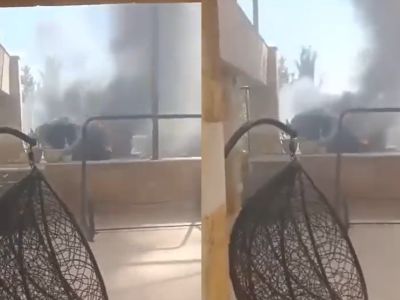

![An Egyptian riot policeman fires tear gas in Cairo, Egypt. [csgazette] An Egyptian riot policeman fires tear gas in Cairo, Egypt. [csgazette]](/sites/default/files/styles/d06_standard/public/im/Egypt/egyptian_riot_police.jpg?itok=cOn7Li0o)

